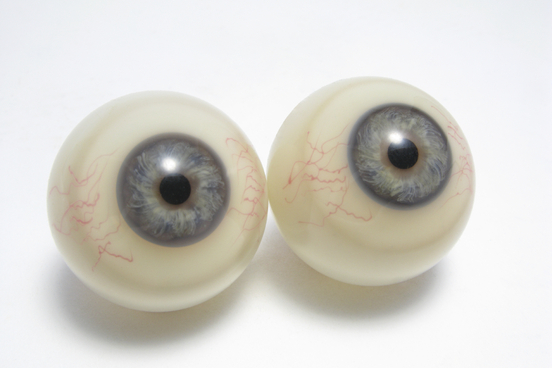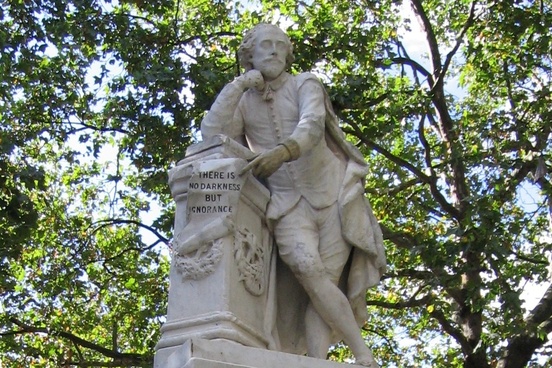One of the most cherished and enduring myths about the English language is that its vocabulary was largely populated through the genius of a single man: William Shakespeare. Without seeking to diminish the importance of the man who is viewed by many as one of our greatest writers, we would like to point out that this is just not the case.
Where did we get this notion? It appears to have come about through a misreading of the data in the Oxford English Dictionary. In 1928, when this work was first published in full, it was hailed as one of the greatest lexicographic achievements of all time. One of the signature achievements of this dictionary was that the editors provided enormous historical context with millions of dated citations. For each headword, the editors gave what was at that time the earliest known use of that word. And for thousands of entries in the first edition of the OED, the first recorded use of a word was found in the works of William Shakespeare.
It should be noted that at no point did the editors of the OED say "We have X entries for which Shakespeare is the earliest known user; therefore he invented X number of words." This assumption was made by readers of that dictionary, who reasoned that if the OED hadn’t found an earlier use that no one else would either. However, most of the citations included in the OED were sent in by volunteers, and these volunteers, unsurprisingly, preferred searching for words in Shakespeare, as opposed to the kinds of documents that might have earlier uses of his "coinages"—such as legal documents, court memoranda, and turgid ecclesiastical screeds.
As lexicographers have gained access to electronic databases the number of words for which Shakespeare is the first recorded source has shrunk dramatically. Yet we still are regularly informed that "Shakespeare coined the word X" in formats ranging from Internet lists to academic papers. So in the spirit of lexical clarity—or, if you prefer, punctiliousness—we present you with a list of words that people love to say were invented by Shakespeare.
They were not.

Assassination
Definition: to murder (a usually prominent person) by sudden or secret attack often for political reasons
Real Fact #807 – Shakespeare invented the word “assassination” and “bump.”
—Snapple Real Facts
We're sorry to diminish anyone's faith in the infallibility of Snapple Real Facts, but assassination was in use for at least several decades before Shakespeare first used it.
“…but where all treason, conspiracy, insurrection, assassination, empoisoment and utter destruction to the state is meant…”
—Sir Thomas Smith, "Letter to Dr. Wilson," 11 April 1572

Bold-faced
Definition: bold in manner or conduct: impudent
Bold-faced, with a hyphen and ending in the adjectival -ed, was coined by Shakespeare in Henry VI, Part I, when Lord Talbot, rescuing his son on a French battlefield, spoke of his "proud desire of bold-faced Victorie."
—William Safire, The New York Times Magazine, 18 January 2004
Despite our longstanding respect for William Safire, we must point out that Shakespeare did not, in fact, coin the word bold-faced.
… I should make you blush, as bolde faced as you be.
—A Treatise of Treasons Against Q. Elizabeth, and the Croune of England Diuided into Two Partes 1572

Uncomfortable
Definition: causing annoyance, embarrassment, or uneasiness
Shakespeare coined an astounding number of words or phrases we still use today, including "catch a cold," "break the ice," "foregone conclusion," "good riddance," "uncomfortable" and "manager.”
—Danny Tyree, The Daily World (Opelousas, LA), 18 April 2016
Although many of the phrases attributed to Shakespeare do appear to have originated with him, most of the words he supposedly created do not, as evidenced by the use of uncomfortable in the early 16th century.
She…hath not been accustomed or brought up in any such affairs or uncomfortable business, but after the homely fashion of the country.
—George Talbot (Earl of Shrewsbury), letter to Thomas Cromwell, 29 May 1534

Deafening
Definition: very loud; earsplitting
The word “deafening” was coined by Shakespeare (McQuain and Malless, 1998, 42)
—Mark Bradbeer and John Casson, Sir Henry Neville, Alias William Shakespeare: Authorship Evidence in the History Plays, 2015
The first recorded instance of Shakespeare using deafening as an adjective comes in the First Folio version of Henry IV, Part 2, published in 1623 (the version of this play published in 1600 used the word deaffing). However, deafening had been used in this manner before the First Folio was published, at least as far back as 1607.
…to her strugling she added such lamentable out-cries, such piercing sorrowes, and such deafening clamors, that euen Heauen & earth were grieued with her infinite tormentings…
—Gervase Markham, The English Arcadia, 1607

Bedazzle
Definition: to thrill or excite (someone) very much
More words and phrases coined by the Bard … ”Bedazzled” – The Taming of the Shrew
—The Independent (London, England), 23 April 2014
Shakespeare did indeed use bedazzled in The Taming of the Shrew, but the verb had been in use already for a couple of decades.
Portcolized & bard with bolts, of gold resplendant bright, of glistering gēmes, through Pallas power, bedazeling eche....
—John Bossewell, Workes of Armorie, 1572

Puke
Definition: to empty what is in your stomach through your mouth
A headline in the Saturday Citizen suggested that Shakespeare invented the word "puked." In fact, he invented the word "puking." The Citizen regrets the error.
—Ottawa Citizen (Ottawa, Ontario) 25 April 2016
Much as we would all love to believe that Shakespeare invented puking, historical accuracy must prevail. He was using the word as a verb ("mewling and puking in the nurse’s arms"), and people had been writing about [puke] for quite some while prior to his use of it.
…shée puketh when shee auoideth her meate out of her gorge into her bowelles.
—Hawking, Hunting, Fouling, and Fishing, 1596

Hurry
Definition: to move, act, or go quickly
Interestingly, William Shakespeare invented the word “hurry.”
—Jeff Napier, Trivia Almanac 2015, 2015
No, Shakespeare did not invent the word hurry. It appears in a list of words in Richard Mulcaster’s Elementarie, in 1582 (sandwiched between hurlebat and hurt), and also may be found in numerous other works before Shakespeare used it.
No maruell then if in their furie, they rush together into the common Hall, if they catch, and hurrie with them Gaius and Aristarchus, Pauls companions.
—Edmund Bunny, The Coronation of David, 1588

Frugal
Definition: characterized by or reflecting economy in the use of resources
Shakespeare created the word "frugal" from the Latin frugalis and its first use is in The Merry Wives of Windsor: "I was then frugall of my mirth."
—The Gazette (Montreal, Que.), 23 April 1994
It is accurate to say that frugal comes from the Latin frugalis, but not that it was created by Shakespeare, as the word was in use well before he was born.
Plato in deede was a frugall man and a great sparer or housba~d, but yet one (that) loued to haue all thynges picked net, and clene.
—Erasmus Desiderius, Apophthegmes (trans. Nicolas Udall), 1542

Eyeball
Definition: the entire round part of the eye
Eyeball: “Go make thyself like a nymph o' the sea: be subject to no sight but thine and mine, invisible to every eyeball else.” Shakespeare’s protagonist Prospero, though no medical doctor, can claim to be the first fictional character to name those round objects with which we see.
—Mental Floss, "20 Words We Owe to William Shakespeare"
While it's true that eyeball may still have been a new word in Shakespeare’s time, he cannot be said to have coined it, as it appears in works going back to at least 1575.
Pupilla mea: Purple. Myne eye ball.
—William Patten, The Calender of Scripture, 1575

Inaudible & Premeditated
Definition: "Impossible to hear" & "Done or made according to a plan: planned in advance"
A discussion of the many words that Shakespeare coined would fit into such activity well. For example, Shakespeare coined the words premeditated and inaudible (Savino, 2011).
—Roe, Kolodziej, Stoodt-Hill, and Burns, Secondary School Literacy Instruction (11th ed.), 2014
Shakespeare coined neither inaudible nor premeditated; the former was used by George Puttenham (among others) prior to the Bard’s use of it, and evidence of premediated may be found from at least as far back as 1564, the year of Shakespeare’s birth.
…our odde sillable is not altogether of that nature, but is in a maner drownd and supprest by the flat accent, and shrinks away as it were inaudible and by that meane the odde verse comes almost to be an euen in euery mans hearing.
—George Puttenham, The Arte of English Poesie, 1589Let death be premeditated, not only because he commeth vncerteinly (I meane for the time, for els he is most certeyne) but also because he helpeth much to the contempt of this worlde…
—John Bradford, A Frutefull Treatise, 1564

Phrases He Actually DID Invent
The phrase wild goose chase is actually from Romeo and Juliet.
SEE 9 MORE >






